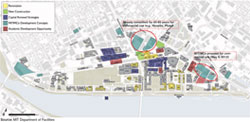
| Vol.
XXIV No.
5 May / June 2012 |
| contents |
| Printable Version |
Editorial
Save MIT Campus Land for Academic,
Not Commercial, Uses
MIT is much more than the sum of its classrooms, laboratories, dormitories, and recreational facilities. And yet this infrastructure of land and buildings is critical for our health. We have grave concerns over several aspects of the proposals from the MIT Investment Management Corporation (MITIMCo) for the predominantly commercial development of the east end of the MIT academic campus.
The MITIMCo proposal transfers unique remaining campus land resources – acquired for MIT’s future educational and research needs – to commercial applications for periods of the order of half a century. The land available for MIT academic expansion in the north campus between Massachusetts Avenue and Main Street has already been leased to commercial tenants for 40- and 60-year periods. The new proposal prepares the way to make comparable long-term leases on MIT’s precious remaining land resources on the east end of campus. Future development of educational, housing, recreation, and academic research facilities will be sharply constrained. This is the last remaining land available for campus-based uses. Implementation of MITIMCo’s plan has the potential to do serious and irreversible damage to MIT’s future educational and research missions.
We recognize that the MITIMCo development will generate substantial real estate investment returns to MIT’s endowment. However, returns on astute real estate investment can be had all over the U.S. and in many cities outside the U.S. Land for MIT campus development in Cambridge is unique and irreplaceable. Using it solely to generate financial returns neglects the enormous opportunity cost incurred if we lose MIT’s options for future expansion and development of our current community learning and living centers. This seems to us to be fundamentally unsound.
Many of our concerns have been raised in the Faculty Newsletter, with articles related to “MIT 2030” by knowledgeable faculty and staff in the November/December 2011 issue. A general response from the administration appeared in the March/April 2012 issue, but the following concerns are not directly addressed:
- The plan was developed without proper and critical input from MIT’s faculty, staff, and students. The process even failed to incorporate the advice and experience of MIT faculty who are national experts on urban development.
- The very serious housing needs of our graduate students, staff, postdoctoral fellows, and (especially younger) faculty have been given low priority. In fact, the initial plan included only 60 units of housing, ignoring the serious analysis and request from the Graduate Student Council (GSC) for substantial new housing, and earning the hostility of our East Cambridge neighbors. (See related article by the GSC president.)
- The proposal fails to seriously consider the impact of the resulting tens of thousands of increased daily auto and transit trips into and out of Kendall Square on the ability of MIT faculty, students, and staff to get to and from the Institute.
- The proposal may violate prior agreements between MIT, the City of Cambridge, and the federal government, risking substantial liability.
We fear that MITIMCo’s separation from responsibility for MIT’s educational and research integrity has contributed to the imbalanced proposal. We are also concerned that the substantial participation in plan development by individuals who may stand to gain directly in proportion to the size of the commercial development introduces conflict of interest issues, and departs from traditional MIT decision-making processes.
We believe the MIT Corporation should instruct MITIMCo to refrain from submitting the zoning petition they apparently plan to place before the Cambridge Planning Board until there has been a fuller and more careful further review by a faculty committee that includes DUSP representatives as well as student and staff constituencies. This will allow a more thorough, thoughtful, long-term plan for irreplaceable land resources that are crucial for MIT’s future.
Editorial Subcommittee
(six members of which are Cambridge residents)
Robert Berwick
Nazli Choucri
Jean Jackson
Gordon Kaufman
Jonathan King
Stephen J. Lippard
James Orlin
Ruth Perry
George Verghese
Patrick Winston
| Back to top | |
| Send your comments |
| home this issue archives editorial board contact us faculty website |
